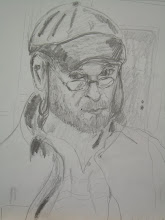El Salvador Part II
My bloated stomach zone liked the idea of tamales, for some reason, which it what I ordered at Comedor a la Vista. The tamale had great flavor, but at least in 'poor zone' there's just a tiny tiny bit of chicken in the masa. If you're expecting something like what you'd get in the US or Mexico, you'd be disappointed.
Comedor a la Vista might mean 'Eatery with a view.' The view consists of a plain concrete wall across the narrow steet filled with cars, a few dogs, throngs of people walking to and fro, vendors who've spread their goods on the sidewalks over sheets or blankets or upon a makeshift table, discarded paper and bits of trash everywhere. It also might mean you see what you get, since everything food offering is in plain view under glass separators.
After breakfast (yes, tamales for breakfast, or you could have stew, as well as eggs) we set out for Hotel Lenca in Perquin, in the mountains area in the eastern part of the country. It was a rebel stronghold during the civil war that decimated this country from 1980-1992. Reagan poured money into this country to keep the right wing in power; the left wing spouted land reform and other populist measures and in general made us look bad. But given how many Salvadorans work in the US and support families back home, I guess our reputation didn't suffer too much. There's a well known museum in the town chronicling the war, which is a main reason for going there, the other the wonderful hotel run by a former PC volunteer.

It took us some three hours to get there. During the chicken bus part of the ride the assistant made a boy give me his seat. The attendant even helped me remove my backpack. There are advantages to residing in geezerdom. My amoebas cooperated, amazingly enough, even during the last hour or so in the back of a pickup truck. We took turns sitting on the hard seats as we bounced along in the cool air.
Hotel Lenca sits half way up a steep hill. I dragged my backpack and intestines up the hill and beyond the office to the rooms. The view is wonderful and inside it's lovingly finished and furnished, and there's loads of hot water.
The next day we walked back to town. Nic noted that Salvadorans laugh at people walking, figuring they are too poor to pay the pickup truck driver his measly 'cora' ($.25) In our case, we just didn't want to wait for one to come by and didn't mind the walk, but a pickup passed going the other way and we endured some jeers. Along the way a somewhat aged looking woman came to talk to us, offering rooms for the night. Her place was quite shabby.
We visited the museum after a short walk through the short town. The entrance fee is practically nothing, especially since a guide was with us the entire time. Not that it helped me all that much. His Spanish was accompanied by a whistling sound of some sort, a kind of thick rural el Salvadoran accent and lots of words I'd never heard before.
Nic and friends did much better. I might beat them on a standard Spanish exam but they've been here a year. Nic didn't understand a word during his first months, but he's flying high now, so I guess if here long enough I'll get used to the way they speak. I would have liked to talk to our guide more. He seemed like a nice fellow. He walked with a limp from his war injury; he fought for the left wingers as a teen during the civil war. Many of his friends and collegues died or were seriously injured during the devastation that gripped not just el Sal, but Guatemala and Nicaragua as well. It was the US and Soviet Union at war by proxy, with many poor and lovely people caught in the middle.
to be continued

No comments:
Post a Comment
Hi, please share your thoughts